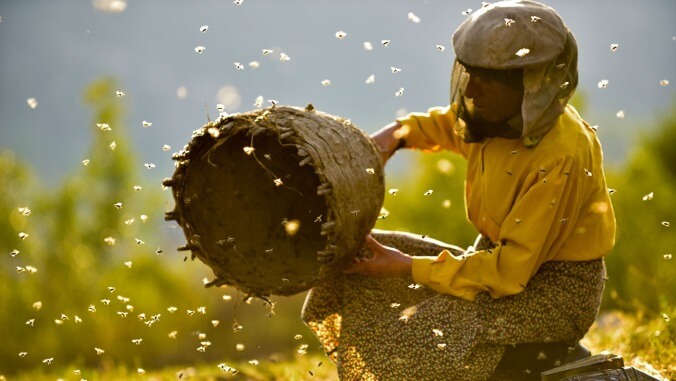Honeyland couches an apocalyptic warning in a beekeeping documentary


Before an apiarist can scrape a single honeycomb, they must first accept that life is pain. We watch a lot of people get stung by a lot of bees in the new documentary Honeyland, and it looks like it hurts just as much every single time. The film’s primary subject, Hatidze Muratova, handles her colony without the protection of gloves, and though she has formed a seemingly extrahuman bond to her insect companions, they’re still liable to cop the occasional attitude and take up a suicide mission just to cause her a few minutes of stabbing agony. Bees can be mercurial, unpredictable animals; they turn on frightened children, the caretakers responsible for their continued survival, and, at one point, a defenseless infant. What could compel a person to devote their life to such a hazardous, punishing purpose?
Maybe it’s the knowledge that the fate of the world rests on their sacred work. Directors Tamara Kotevska and Ljubomir Stefanov select this almost comically obscure topic (seriously, try to keep a straight face while telling a friend they just have to see this new Macedonian beekeeping documentary) as a microcosm for an Earth at its make-or-break point, structuring Hatidze’s dogged efforts to keep her colonies alive in a sustainable capacity as a life-or-death metaphor. She’s the canary in the coal mine of resource depletion, the bellwether warning us of the destruction soon to come on a globally cataclysmic scale. Though Honeyland is also about what it’s about; in addition to underscoring another inconvenient truth with planetary stakes, the film offers tender, patient portraiture to a woman wholly dedicated to her calling. The melding of the political with the personal has seldom involved so many stingers to the face.
Hatidze enjoys a quiet, modest day-to-day in the hinterlands north of Greece, where she can care for her cranky ailing mother and harvest the delicious byproducts from her bees’ natural hives inside stone walls. Both tasks require a gentle respect, and Hatidze exercises humility in all she does. It is imperative, we learn, that she always leave half the honey in the hive, so that the bees may produce more in the future. She’s a conservationist, cognizant of the fact that over-drawing on the bees will guarantee their demise, and willing to tighten her belt if it means subsisting past the next few years.
Enter Hussein Sam, a Turkish family man setting up shop with his wife and eight little ones in Hatidze’s neck of the woods. They get along well enough at first, with the affable woman even showing her new neighbor the ropes of the beekeeping game. Except that Hussein can’t afford to wait for the slow drip of honey only to leave 50% of the goods untouched, what with the many bellies he’s got to keep full. Using more sophisticated weighing equipment than his mentor—as ever, the problem-solving promise of technology leads only to more numerous and complicated issues—he introduces a problem with no solution, as human demand exceeds the natural environment’s supply for the first time in this corner of the region. Hatidze’s expectedly furious when Hussein’s reckless honey-mongering decimates the hive, but the filmmakers clarify that his other option was allowing his family to starve. Though he acts imprudently, we’d be hard-pressed to find a better way.
In one of the few situationally called-for usages of drone-shot footage in recent documentary cinema, Kotevska and Stefanov offer a panoramic view of the countryside. Although it’s beautiful in a barren sort of way, there’s not all that much to see: dust, sand, dirt, rocks, and the occasional sprinkling of grass. They effectively communicate just how little there is to go around, and how that scarcity boxes the individuals living under it into acting rashly. Cooperation and moderation may be our species’ saving grace, just as with our buzzing helpers, but at a certain point of desperation, it’s simply not enough.
The film establishes that Hatidze may be the last of her kind to carry on this dying European tradition, the practice of so-called bee hunting as opposed to impersonal, industrial beekeeping. When she weeps over a handful of drones left crunchy and dead by Hussein’s actions, the specter of extinction hangs over her (and us). The moment’s power extends beyond the limits of her circumstance, fascinating and under-explored as it is, to cover the whole of existence. As she cries for the bees, we can hear our own terrifying death knell.